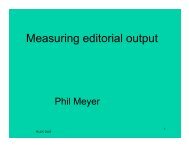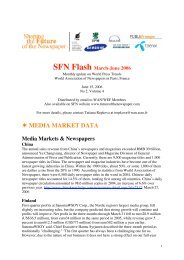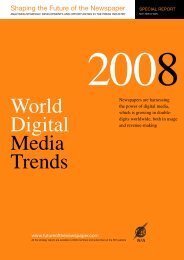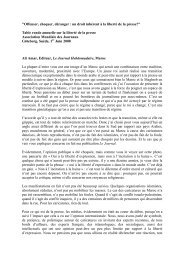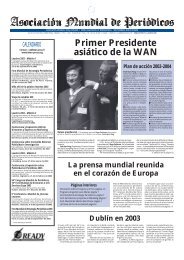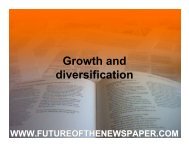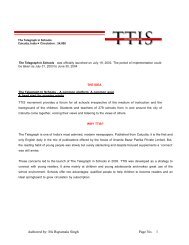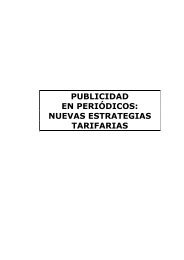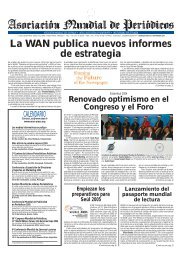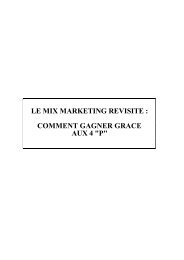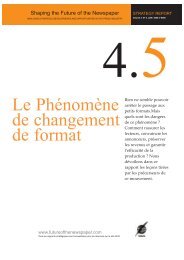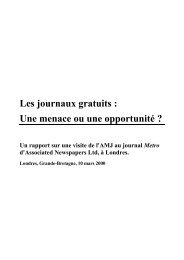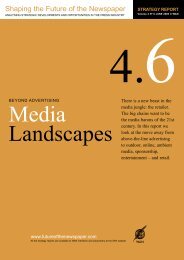WORLD PRESS TRENDS - World Association of Newspapers
WORLD PRESS TRENDS - World Association of Newspapers
WORLD PRESS TRENDS - World Association of Newspapers
Create successful ePaper yourself
Turn your PDF publications into a flip-book with our unique Google optimized e-Paper software.
POLAND<br />
Commentary - Polish Chamber <strong>of</strong> Press Publishers<br />
2002 was definitely the most difficult year for the Polish<br />
economy since the end <strong>of</strong> the Soviet era. The economic<br />
slowdown continued, and though conditions improved slightly<br />
over the course <strong>of</strong> the year, there was no sign <strong>of</strong> a sustained<br />
revival. State finances, which need restructuring, were left<br />
unreformed.<br />
In 2002 the inflation rate decreased drastically - from 3.4% yearon-year<br />
in January to 1.1% in October. This was a result <strong>of</strong> the<br />
National Bank <strong>of</strong> Poland’s tight monetary policy and lower food<br />
prices, though industrial prices continued to rise.<br />
The greatest problem and challenge faced by the Polish economy<br />
is unemployment – since early 2002 18% <strong>of</strong> the workforce has<br />
been without a job.<br />
2002 was the second consecutive year <strong>of</strong> low economic growth.<br />
It is estimated that GDP increased by only 1.5%. Domestic<br />
consumption dropped dramatically, and while the Council <strong>of</strong><br />
Monetary Policy lowered base interest rates several times during<br />
the year, commercial banks did not lower their rates by as much,<br />
leaving bank loans beyond the reach <strong>of</strong> many.<br />
Last year Poland completed negotiations to enter the European<br />
Union. Poland’s future membership in the EU will give it greater<br />
credibility on financial markets; in fact its credibility has already<br />
improved – Moody’s increased Poland’s credit rating from Baa1<br />
to A2 in 2002.<br />
Poland is expected to grow slightly faster in 2003 than in 2002 –<br />
by between 2.0% and 2.5% – thanks to improved domestic<br />
consumption and optimism related to imminent membership<br />
<strong>of</strong> the EU.<br />
Poland’s economic situation has directly affected the publishing<br />
market. Daily newspaper circulation dropped by 2.6% in 2002.<br />
<strong>Newspapers</strong> supported by political parties recorded the greatest<br />
drop in circulation: Trybuna lost 23% and Zycie lost 31%.<br />
Specialist newspapers such as Dziennik Sportowy (sport) or Puls<br />
Biznesu (business) increased their circulation. Gazeta Prawna<br />
increased its frequency <strong>of</strong> publication from three editions a week<br />
in 2001 to five a week in 2002, and also managed to increase its<br />
circulation.<br />
Aiming to halt the decline in circulation, many publishers added<br />
gifts to their papers, including CDs with songs, useful computer<br />
programs or maps. <strong>Newspapers</strong> also published books for<br />
learning languages, city plans and so on. Regional papers paid<br />
more attention to local news, and several created municipal or<br />
poviat (county) supplements.<br />
Press advertising expenditure increased by 2% when measured<br />
at ratecard prices; however, actual revenues dropped as<br />
publishers granted agencies larger discounts. Building, finance,<br />
motor car and transport industries cut down on their<br />
advertisement expenses while a reverse pattern was noted in<br />
the health products, drugs and food segments. Since these<br />
segments tend to favour television advertising, television<br />
continued to increase its share <strong>of</strong> the market.<br />
Many publishers reacted to their falling revenues by cutting<br />
overheads, including jobs. Some closed supplements, such as<br />
Gazeta Wyborcza, which stopped publishing its five regional<br />
supplements.<br />
Two national newspapers closed in 2002: Zycie and Prawo i<br />
Gospodarka. The regional newspaper <strong>of</strong> Bydgoszcz, Ilustrowany<br />
Kurier Polski, also closed<br />
Consolidation <strong>of</strong> media ownership continued in 2002. The large<br />
publishers Agora and H. Bauer both bought titles during the<br />
year.<br />
The draft Radio and Television Broadcasting Act continues to<br />
be a political problem. As it stands, the draft would prevent a<br />
national newspaper from owning a television station. This drew<br />
criticism for unduly limiting business activities and the freedom<br />
<strong>of</strong> mass media, and as a result the draft was withdrawn.<br />
The Copyrights Act has been amended, and now entitles<br />
publishers to receive fees from companies that copy newspaper<br />
articles. Publishers’ lobbying efforts were also rewarded when<br />
the VAT Act was emended to introduce a new definition <strong>of</strong> the<br />
specialist press, entitling qualifying titles to apply 0% VAT.<br />
POPULATION<br />
Population by age and sex<br />
All individuals Male Female Households<br />
000 % 000 % 000 % 000<br />
Children 7,636 20 3,918 21 3,719 19 12,501 *<br />
16-24 5,923 15 3,015 16 2,908 15<br />
25-34 5,441 14 2,770 15 2,672 13<br />
35-44 5,520 14 2,773 15 2,747 14<br />
45-54 5,914 15 2,895 15 3,019 15<br />
55-64 3,366 9 1,548 8 1,818 9<br />
65+ 4,832 13 1,842 10 2,990 15<br />
Total 38,633 100 18,761 100 19,872 100<br />
Source: Statistical Yearbook <strong>of</strong> the Republic <strong>of</strong> Poland 2001<br />
* 1995 data, which is the most recent available on households<br />
Newspaper reach (%)<br />
Daily Weekly Monthly<br />
All adults 31.7 59.3 61.5<br />
Men 33.5 64.9 65.9<br />
Women 27.0 56.1 57.8<br />
MHS 16.8 33.5 35.6<br />
Source: SMG/KRC<br />
MHS: Main Household Shopper<br />
<strong>WORLD</strong> ASSOCIATION OF NEWSPAPERS - <strong>WORLD</strong> <strong>PRESS</strong> <strong>TRENDS</strong> 2003 219




